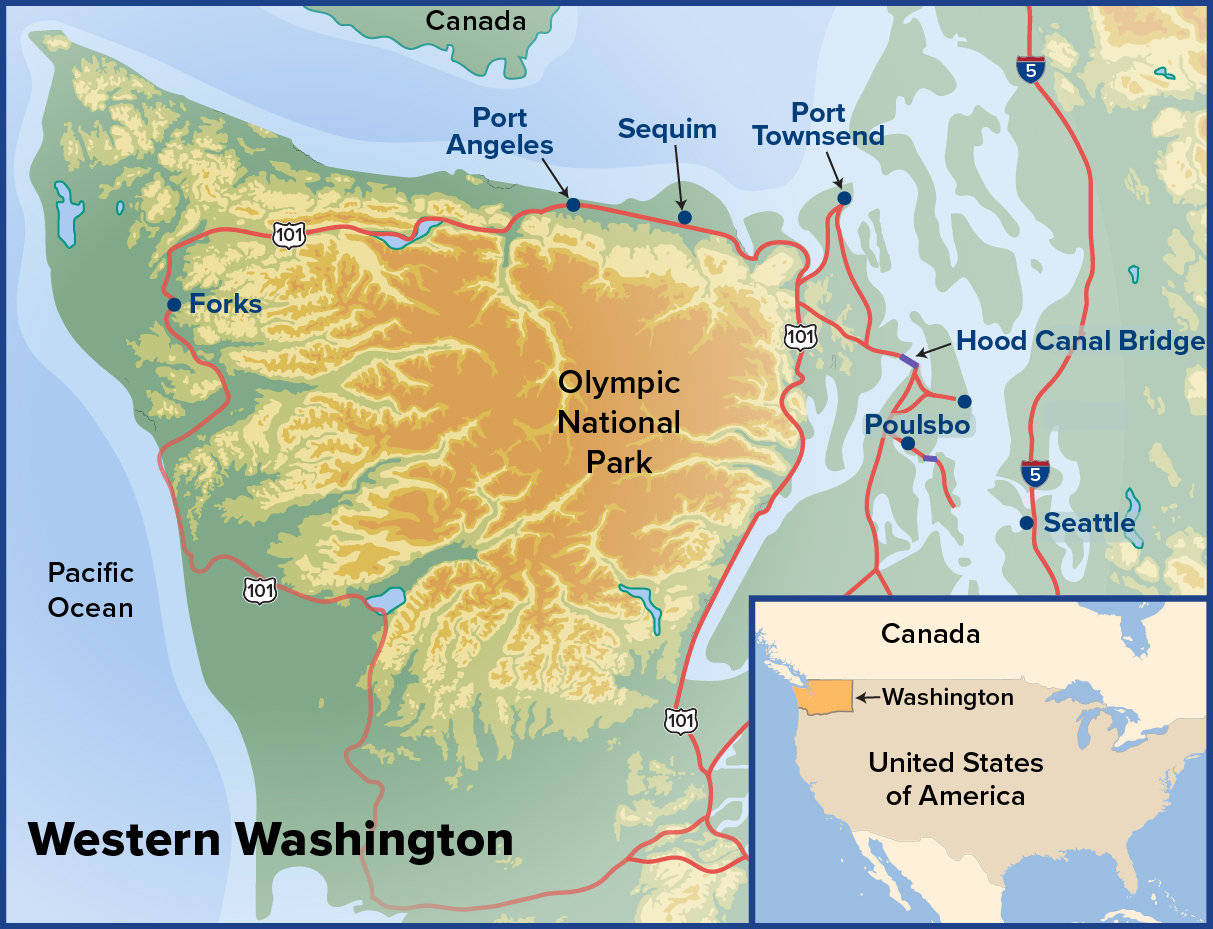 Listen to this story.
Listen to this story.
PEG_booth

Photo courtesy of Sally Rodgers
For the past two years, Cheyenne Tuller and Sally Rodgers (from left to right) along with other volunteers in the Pet Emergency Group on Washington state's Olympic Peninsula have set up booths at local events to raise awareness and support for an after-hours veterinary emergency service.
Overnight last Friday, Saturday and Sunday, Dr. Amanda Mason saw 17 patients at a veterinary hospital in Sequim, a small city on the remote Olympic Peninsula of Washington state.
That may not seem like a big deal, but the mere fact that the veterinary clinic was accepting patients long after most residents were tucked in bed was groundbreaking.
For more than 10 years, no veterinary practice in or around the rural cities of Forks, Port Angeles, Port Townsend and Sequim has been open on weekend nights to serve sick or injured cats and dogs. The sparsely populated area in northwest Washington, home to the Olympic National Park, is surrounded by water on three sides.
When faced with after-hours emergencies, most local pet owners have had to drive for at least an hour to the nearest 24-hour emergency room, a trip that requires crossing a bridge that makes frequent unscheduled closures to accommodate marine traffic or bow to foul weather. Two alternative ERs are a more than two-hour drive down a winding, forested highway. For the many seniors who live in the area, tackling that road at night is a nonstarter.
Animals have suffered and died for lack of timely access to care, according to veterinarians and owners in the area.
In late 2021, a small group of residents, with not a single veterinarian or veterinary technician among them, decided enough was enough. They formed a nonprofit called the Pet Emergency Group (PEG) with the mission "to build, grow and sustain after-hours pet emergency services on the Olympic Peninsula."
Their ambition might appear quixotic, even naïve, considering that 75% of emergency and specialty hospitals in the United States are owned by large corporations, many backed by private equity, according to a 2022 estimate by the animal health firm Brakke Consulting.
The PEG operations team met bimonthly, held public Zoom calls every month, surveyed local veterinarians and pet owners, raised awareness and funds at local events, and networked far and wide. Those efforts brought together the people and resources to launch Peninsula Pet Emergency, Mason's after-hours veterinary service.
From the moment she opened on the evening of June 6, Mason had clients waiting. Among the more serious emergencies over the course of three nights were a dog with a fracture and a laceration, another that had swallowed a foreign body and required surgery and 24-hour monitoring, and one that was severely injured by a car and had to be euthanized.
"It was what I was expecting: real emergencies that were greatly time-sensitive," Mason said. "I told my husband, 'I wonder what people would have done if I wasn't here.' "
'Just lots of boots on the ground and calling people'
The networker-in-chief for the nonprofit that initiated the effort is Sally Rodgers. A retired administrator for human hospitals, she moved to Sequim (pronounced "Skwim"), population 8,200, from Portland, population 635,000, in 2020 with her husband and two dogs.
"I thought that there were plenty of vets in the area and didn't understand or think about the fact that they didn't provide after-hours services, at least nothing available to the general public," she said. "I do think a handful of vets offered some availability to their clients, but it left most of the population without access."
She became aware of the gap while reading Nextdoor, a neighborhood networking platform where locals posted about being unable to get veterinary care at night or on the weekend, with tragic consequences.
She and three other like-minded residents — a lawyer, a chief financial officer for a health company and a telecommunications manager — quickly coalesced into an unpaid board that was assisted by about a dozen other volunteers.
Rodgers modestly describes PEG's work as "just a lot of boots on the ground and calling people." The group developed a picture of local conditions through two surveys — one of all the area veterinarians they could find and the other of locals who visited their booths at events.
Among the questions they asked veterinarians was whether they would want to revive a shared on-call rotation that had once covered after-hours emergencies. The answer was a resounding "no." They cited many barriers, including burnout and staff shortages.
The veterinarians surveyed also expressed skepticism that the region, consisting of the two most-northern counties on the peninsula with a combined population of about 110,000, could provide enough business to support a 24/7 emergency hospital.
Rodgers described PEG's research as continually discovering "what we couldn't do." That included the idea of creating a nonprofit hospital potentially administered by PEG. Across the country, three veterinarians recently opened a nonprofit ER in Rochester, New York, after a corporate hospital shut down.
That sort of approach was off the table in Washington, however, not merely because the startup costs were estimated at more than $2 million, Rodgers said. Her understanding of Washington legal code is that it constrains the scope of veterinary care provided by nonprofits such that they may not offer regular, extensive ER services.
WA map

The PEG board even had virtual meetings with the management team of a large veterinary emergency hospital group. According to Rodgers, company representatives supported the community effort but said its business model wouldn't work in a rural area due to staffing challenges and a lack of population density. That didn't stop Rodgers from trying to convince them to adjust their model.
Rodgers recalled telling them: "You're going to run out of market share eventually in the suburbs, so then you're going to need to come to Sequim."
She finally got a break during a chat with a veterinarian who had worked with Mason while managing an emergency practice. He admired the young associate and, knowing that she didn't like working in a corporate setting, thought she might be a good fit for the project.
Rogers said, "That's when we discovered this could very well be our solution: veterinarians who have been in the corporate world and were dropping out because of burnout and extreme dissatisfaction."
From disappointment to inspiration
Mason, a Texas A&M University class of 2020 graduate, makes no bones about the fact that corporate practice is not for her. "I think that corporations may have underestimated us as veterinarians and maybe not quite have understood why we do this job," she said. "There's only so much money that a veterinarian can take to continue working in a setting where they don't feel fulfilled or like they're able to help their patients to the best of their ability."
She worked at three different corporate ERs in western Washington before going full-time as a relief veterinarian and eventually being tapped by PEG to consider coming to Sequim.
Mason said she'd been aware of the veterinary vacuum on the Olympic Peninsula. While working at the closest veterinary emergency hospital in the city of Poulsbo, Mason had been on the receiving end of calls from desperate pet owners. She remembered one case of an owner stuck with a very sick pet on the other side of the bridge. "It was closed overnight," Mason recalled. "The dog sounded like … it was bleeding out into its abdomen. It sounded like it was actively dying. And we had to tell them just to hold their dog in their car and be with it."
That she could be part of keeping that from happening to others and be her own boss was an inspiration. But how? She wasn't willing to take on a multimillion-dollar business loan to set up an emergency practice.
That's when PEG played matchmaker. Rodgers introduced Mason to Dr. Linda Allen, who has owned a general practice in downtown Sequim since 1999.
Allen had been one of three practitioners who took after-hours calls on a rotating basis for many years. The other veterinarians stepped out of the arrangement in 2014, when one sold his practice and the other retired. For a while, Allen soldiered on alone until she realized it was unsustainable.
Since then, she has offered after-hours care for her clients and sometimes the friends of clients and others in a jam.
"We do what we have to do," she said. But even with the limited scope, she was seeing patients many nights a week and on weekends, and she's worn out.
Mason and Allen

VIN News Service photo
Drs. Amanda Mason (left) and Linda Allen stand outside the small animal hospital in Sequim, Washington, that Allen has owned and operated since 1999. Mason is now leasing space and equipment at the practice to provide after-hours emergency care to dogs and cats, ending a 10-year drought in weekend overnight veterinary service on the Olympic Peninsula.
Now Allen is leasing her clinical space and equipment to Mason.
The veterinarians spoke to the VIN News Service in the lobby of the Sequim practice one week before the opening. They exuded an easy camaraderie that belied the relatively short duration of their relationship, as they talked amid piles of supplies — kitty litter, garbage bags, cases of bottled water — that Mason had just unloaded from her car.
"I feel honored that I can help somebody that has the passion that she does," Allen said. "And her being here has already helped so many animals because it has freed me up."
Allen explained that by not needing to be available for emergencies three nights a week, she has more time to pursue activities like hosting spay and neuter clinics for shelter animals and serving on a local government committee on companion animal welfare.
Mason sees patients from 6 p.m. to 8 a.m. on Fridays, Saturdays and Sundays. She is assisted by a team of two licensed veterinary technicians, a veterinary assistant and someone covering reception and administrative tasks. Her aim is to provide intermediate emergency care, something between no intervention and the full bells-and-whistles medicine available at a large ER and specialty practice.
She believes that her lower overhead can be passed on as lower costs for clients, particularly for surgery, which she and Allen said regularly exceeds $8,000 at other western Washington emergency hospitals. Keeping costs affordable is also a reason Mason doesn't aspire to grow into a round-the-clock, seven-days-a-week hospital that would be more expensive to run. Her goal for now is to someday be open 24 hours on weekends.
PEG isn't invested financially in the new emergency service, Rodgers said. It is Mason's own for-profit business. PEG is a facilitator, mostly building relationships — like the one between Allen and Mason — and driving awareness. The announcement that Mason was coming to town garnered more than 70,000 views in a week on PEG's Facebook page. The Peninsula Pet Emergency website has had 8,400 views, and 663 visitors have pre-registered as clients using an online sign-up form, according to Mason.
Meanwhile, Rodgers says that as PEG stands ready to assist the new service when needed, it's also taking a broader view of its mission to grow and sustain after-hours care on the peninsula. That includes an initiative to address labor challenges by starting a veterinary technician training program at a local community college and maybe creating a fund to help pay for emergency care for pet owners who can't afford it.
As Rodgers explained, PEG just keeps asking, "What's the next barrier?"